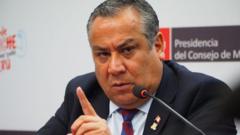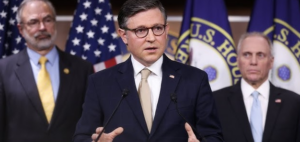In a complex legislative environment, congressional leaders have introduced a massive spending bill designed to keep the government funded through mid-March, as it faces criticism from factions within the Republican Party.
Congressional Leaders Propose Spending Bill Amid Controversy

Congressional Leaders Propose Spending Bill Amid Controversy
Legislation seeks to avert government shutdown while addressing disaster recovery efforts.
On December 17, 2024, congressional leaders released a proposal that would not only maintain government funding but also allocate close to $100 billion in assistance for areas hit hard by natural disasters, particularly hurricanes. The bill, exceeding 1,500 pages, combines a continuing resolution with various policies related to agriculture, health, and the environment, sparking discontent among some members of the House.
Speaker Mike Johnson emphasized the urgent need for disaster relief, particularly in the wake of recent hurricanes in the Southeast. He argued that lawmakers have a responsibility to assist victims and highlighted the inclusion of $10 billion for economic aid to farmers and $21 billion aimed specifically for disaster relief.
Despite the intentions behind the legislation, there is potential for significant backlash against the bill, as several House Republicans are voicing their disapproval. They contend that cramming numerous unrelated policies into one large bill could lead to discord within the party, undermining support. These critics include a mix of mainstream conservatives who feel this approach is untenable.
The primary aim of this sweeping legislation is to prevent a government shutdown ahead of a critical deadline, slated for March 14, when an additional funding agreement will be necessary. As it stands, Speaker Johnson is working to rally support amidst increasing doubts from fellow lawmakers about the lengthy and multifaceted nature of the bill.
Speaker Mike Johnson emphasized the urgent need for disaster relief, particularly in the wake of recent hurricanes in the Southeast. He argued that lawmakers have a responsibility to assist victims and highlighted the inclusion of $10 billion for economic aid to farmers and $21 billion aimed specifically for disaster relief.
Despite the intentions behind the legislation, there is potential for significant backlash against the bill, as several House Republicans are voicing their disapproval. They contend that cramming numerous unrelated policies into one large bill could lead to discord within the party, undermining support. These critics include a mix of mainstream conservatives who feel this approach is untenable.
The primary aim of this sweeping legislation is to prevent a government shutdown ahead of a critical deadline, slated for March 14, when an additional funding agreement will be necessary. As it stands, Speaker Johnson is working to rally support amidst increasing doubts from fellow lawmakers about the lengthy and multifaceted nature of the bill.




















